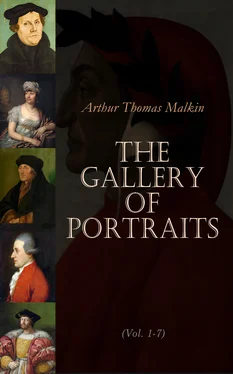He continued his study of the law at Lincoln’s Inn, but resided in Bucklersbury after his marriage. His first wife lived about seven years. By her he had three daughters and one son; and we are informed by his son-in-law, Roper, that he brought them up with the most sedulous attention to their intellectual and moral improvement. It was a quaint exhortation of his, that they should take virtue and learning for their meat, and pleasure for their sauce.
In the latter part of King Henry the Seventh’s time, and at a very early age, More distinguished himself in parliament. The King had demanded a subsidy for the marriage of his eldest daughter, who was to be the Scottish Queen. The demand was not complied with. On being told that his purpose had been frustrated by the opposition of a beardless boy, Henry was greatly incensed, and determined on revenge. He knew that the actual offender, not possessing anything, could not lose anything; he therefore devised a groundless charge against the father, and confined him to the Tower till he had extorted a fine of £100 for his alleged offence. Fox, Bishop of Winchester, a privy councillor, insidiously undertook to reinstate young More in the King’s favour: but the Bishop’s Chaplain warned him not to listen to any such proposals; and gave a pithy reason for the advice, highly illustrative of Fox’s real character. “To serve the King’s purposes, my lord and master will not hesitate to consent to his own father’s death.” To avoid evil consequences, More determined to go abroad. With this view, he made himself master of the French language, and cultivated the liberal sciences, as astronomy, geometry, arithmetic, and music; he also made himself thoroughly acquainted with history: but in the mean time the King’s death rendered it safe to remain in England, and he abandoned all thoughts of foreign travel.
Notwithstanding his practice at the bar, and his lectures, which were quoted by Lord Coke as undisputed authority, he found leisure for the pursuits of philosophy and polite literature. In 1516 he wrote his Utopia, the only one of his works which has commanded much of public attention in after times. In general they were chiefly of a polemic kind, in defence of a cause which even his abilities could not make good. But in this extraordinary work he allowed his powerful mind fair play, and considered both mankind and religion with the freedom of a true philosopher. He represents Utopia as one of those countries lately discovered in America, and the account of it is feigned to be given by a Portuguese, who sailed in company with the first discoverer of that part of the world. Under the character of this Portuguese he delivers his own opinions. His History of Richard III. was never finished, but it is inserted in Kennet’s Complete History of England. Among his other eminent acquaintance, he was particularly attached to Erasmus. They had long corresponded before they were personally known to each other. Erasmus came to England for the purpose of seeing his friend; and it was contrived that they should meet at the Lord Mayor’s table before they were introduced to each other. At dinner they engaged in argument. Erasmus felt the keenness of his antagonist’s wit; and when hard pressed, exclaimed, “You are More, or nobody;” the reply was, “You are Erasmus, or the Devil.”
Before More entered definitively into the service of Henry VIII. his learning, wisdom, and experience were held in such high estimation, that he was twice sent on important commercial embassies. His discretion in those employments made the King desirous of securing him for the service of the court; and he commissioned Wolsey, then Lord Chancellor, to engage him. But so little inclined was he to involve himself in political intrigues, that the King’s wish was not at the time accomplished. Soon after, More was retained as counsel for the Pope, for the purpose of reclaiming the forfeiture of a ship. His argument was so learned, and his conduct in the cause so judicious and upright, that the ship was restored. The King upon this insisted on having him in his service; and, as the first step to preferment, made him Master of the Requests, a Knight and Privy Councillor.
In 1520 he was made Treasurer of the Exchequer: he then bought a house by the river-side at Chelsea, where he had settled with his family. He had at that time buried his first wife and was married to a second. He continued in the King’s service full twenty years, during which time his royal master conferred with him on various subjects, including astronomy, geometry, and divinity; and frequently consulted him on his private concerns. More’s pleasant temper and witty conversation made him such a favourite at the palace, as almost to estrange him from his own family; and under these circumstances his peculiar humour manifested itself; for he so restrained the natural bias of his freedom and mirth as to render himself a less amusing companion, and at length to be seldom sent for but on occasions of business.
A more important circumstance gave More much consequence with the King. The latter was preparing his answer to Luther, and Sir Thomas assisted him in the controversy. While this was going on, the King one day came to dine with him; and after dinner walked with him in the garden with his arm round his neck. After Henry’s departure, Mr. Roper, Sir Thomas’s son-in-law, remarked on the King’s familiarity, as exceeding even that used towards Cardinal Wolsey, with whom he had only once been seen to walk arm in arm. The answer of Sir Thomas was shrewd and almost prophetic. “I find his Grace my very good lord indeed, and I believe he doth as singularly favour me as any subject within this realm. However, Son Roper, I may tell thee, I have no cause to be proud thereof; for if my head would win him a castle in France it should not fail to go.”
In 1523 he was chosen Speaker of the House of Commons, and displayed great intrepidity in the discharge of that office. Wolsey was afraid lest this parliament should refuse a great subsidy about to be demanded, and announced his intention of being present at the debate. He had previously expressed his indignation at the publicity given to the proceedings of the house, which he had compared to the gossip of an ale-house. Sir Thomas More therefore persuaded the members to admit not only the Cardinal, but all his pomp; his maces, poll-axes, crosses, hat, and great seal. The reason he assigned was, that should the like fault be imputed to them hereafter, they might be able to shift the blame on the shoulders of his Grace’s attendants. The proposal of the subsidy was met with the negative of profound silence; and the Speaker declared that “except every member could put into his one head all their several wits, he alone in so weighty a matter was unmeet to make his Grace answer.” After the parliament had broken up, Wolsey expressed his displeasure against the Speaker in his own gallery at Whitehall; but More, with his usual quiet humour, parried the attack by a ready compliment to the taste and splendour of the room in which they were conversing.
On the death of Sir Richard Wingfield, the King promoted Sir Thomas to the Chancellorship of the Duchy of Lancaster. At this time the see of Rome became vacant, and Wolsey aspired to the Papacy; but Charles V. disappointed him, and procured the election of Cardinal Adrian. In revenge, Wolsey contrived to persuade Henry that Catharine was not his lawful wife, and endeavoured to turn his affections towards one of the French King’s sisters. The case was referred to More, who was assisted by the most learned of the Privy Council; and he managed, difficult as it must have been to do so, to extricate both himself and his colleagues from the dilemma. His conduct as ambassador at Cambray, where a treaty of peace was negotiated between the Emperor, France, and England, so confirmed the favour of his master towards him, that on the fall of the Cardinal he was made Lord Chancellor. The great seal was delivered to him on the 25th of October, 1530. This favour was the more extraordinary, as he was the first layman on whom it was bestowed: but it may reasonably be suspected that the private motive was to engage him in the approval of the meditated divorce. This he probably suspected, and entered on the office with a full knowledge of the danger to which it exposed him. He performed the duties of his function for nearly three years with exemplary diligence, great ability, and uncorrupted integrity. His resignation took place on the 16th May, 1533. His motive was supposed to be a regard to his own safety, as he was sensible that a confirmation of the divorce would be officially required from him, and he was too conscientious to comply with the mandate of power, against his own moral and legal convictions.
Читать дальше












